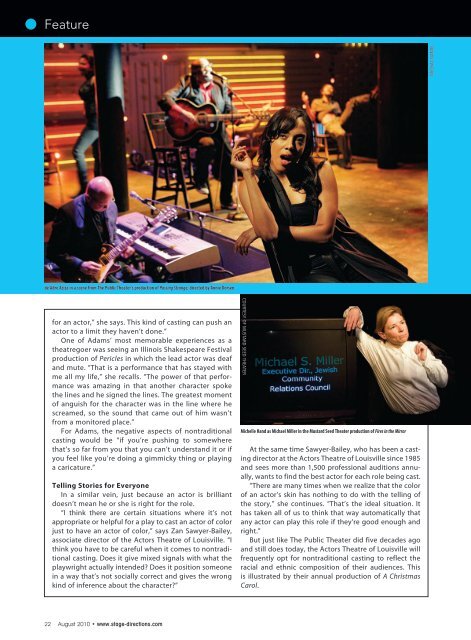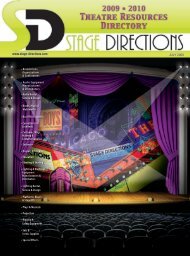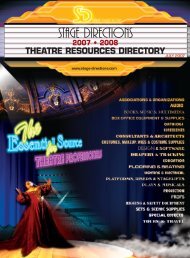Download a PDF - Stage Directions Magazine
Download a PDF - Stage Directions Magazine
Download a PDF - Stage Directions Magazine
You also want an ePaper? Increase the reach of your titles
YUMPU automatically turns print PDFs into web optimized ePapers that Google loves.
Feature<br />
Michal Daniel<br />
de’Adre Aziza in a scene from The Public Theater’s production of Passing Strange, directed by Annie Dorsen.<br />
for an actor,” she says. This kind of casting can push an<br />
actor to a limit they haven’t done.”<br />
One of Adams’ most memorable experiences as a<br />
theatregoer was seeing an Illinois Shakespeare Festival<br />
production of Pericles in which the lead actor was deaf<br />
and mute. “That is a performance that has stayed with<br />
me all my life,” she recalls. “The power of that performance<br />
was amazing in that another character spoke<br />
the lines and he signed the lines. The greatest moment<br />
of anguish for the character was in the line where he<br />
screamed, so the sound that came out of him wasn’t<br />
from a monitored place.”<br />
For Adams, the negative aspects of nontraditional<br />
casting would be “if you’re pushing to somewhere<br />
that’s so far from you that you can’t understand it or if<br />
you feel like you’re doing a gimmicky thing or playing<br />
a caricature.”<br />
Telling Stories for Everyone<br />
In a similar vein, just because an actor is brilliant<br />
doesn’t mean he or she is right for the role.<br />
“I think there are certain situations where it’s not<br />
appropriate or helpful for a play to cast an actor of color<br />
just to have an actor of color,” says Zan Sawyer-Bailey,<br />
associate director of the Actors Theatre of Louisville. “I<br />
think you have to be careful when it comes to nontraditional<br />
casting. Does it give mixed signals with what the<br />
playwright actually intended? Does it position someone<br />
in a way that’s not socially correct and gives the wrong<br />
kind of inference about the character?”<br />
Courtesy of Mustard Seed Theater<br />
Michelle Hand as Michael Miller in the Mustard Seed Theater production of Fires in the Mirror<br />
At the same time Sawyer-Bailey, who has been a casting<br />
director at the Actors Theatre of Louisville since 1985<br />
and sees more than 1,500 professional auditions annually,<br />
wants to find the best actor for each role being cast.<br />
“There are many times when we realize that the color<br />
of an actor’s skin has nothing to do with the telling of<br />
the story,” she continues. “That’s the ideal situation. It<br />
has taken all of us to think that way automatically that<br />
any actor can play this role if they’re good enough and<br />
right.”<br />
But just like The Public Theater did five decades ago<br />
and still does today, the Actors Theatre of Louisville will<br />
frequently opt for nontraditional casting to reflect the<br />
racial and ethnic composition of their audiences. This<br />
is illustrated by their annual production of A Christmas<br />
Carol.<br />
22 August 2010 • www.stage-directions.com

















